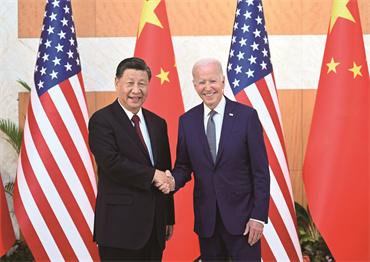hinese President Xi Jinping met with US President Joe Biden in Bali, Indonesia on November 14, 2022 on the sidelines of the G20 Summit. The two leaders agreed to improve China-US relations by increasing communications and cooperation.
According to Chinese Foreign Minister Wang Yi, the talks which lasted more than three hours were “rich in content,” with five main topics of discussion: the two sides’ domestic and foreign policies, China-US relations, the Taiwan question, dialogue and cooperation in various fields, and major international and regional issues.
Sino-US relations topped the agenda. Xi, according to a briefing released by China’s Ministry of Foreign Affairs, told Biden that China-US relations should not be a zero-sum game where one side out-competes or thrives at the expense of the other and that China and the US should form a correct perception of each other’s domestic and foreign policies and strategic intentions and define China-US interactions by dialogue and win-win cooperation.
“China does not seek to change the existing international order or interfere in the internal affairs of the United States, and has no intention to challenge or displace the United States,” Xi said, adding that both countries should ensure that China-US relations “move forward on the right course without losing direction or speed, still less having a collision.”
The Taiwan question is a big concern. Xi said that the Taiwan question is “at the very core of China’s core interests, the bedrock of the political foundation of China-US relations, and the first red line that must not be crossed in China-US relations.” He underscored that China hopes “to see, and are all along committed to, peace and stability across the Taiwan Strait” which is “as irreconcilable as water and fire” with “Taiwan independence.”
Biden, according to the White House readout, said that the US “will continue to compete vigorously with the PRC,” but this competition “should not veer into conflict.” He told Xi that the US does not seek a new cold war, which he reiterated at the press conference following the meeting.
As for the Taiwan question, Biden said that the US’s one-China policy has not changed, the US opposes any unilateral changes to the status quo by either side, and the world has an interest in the maintenance of peace and stability in the Taiwan Strait, according to the White House.
Biden told Xi that the US does not support “Taiwan independence,” or support “two Chinas” or “one China, one Taiwan,” and has no intention to have a conflict with China, the Chinese Foreign Ministry said. Biden also said that the US respects China’s system, and does not seek to change it, nor seek to revitalize alliances against China. The US has no intention to seek “de-coupling” from China, to halt China’s economic development, or to contain China.
Both presidents, according to the US briefing, exchanged views on the Russia-Ukraine war and agreed that “a nuclear war should never be fought and can never be won.” ��
Maintaining communications and cooperation is another focus as the two heads of State agreed to make good use of China-US joint working groups to solve international challenges, such as climate change, food security, public health and global macroeconomic stability. The White House said the two leaders have agreed to a visit to China by Secretary of State Antony Blinken to follow up on their discussions.
At the press conference following the bilateral talk, Foreign Minister Wang Yi summed up the meeting between Xi and Biden as one that “played the leadership role to set the relationship on the right course andalso laid out plans to this end.”

 Old Version
Old Version